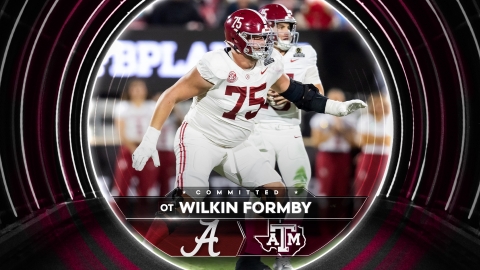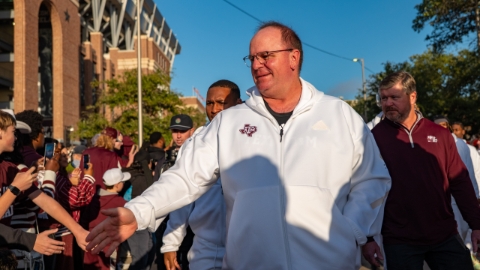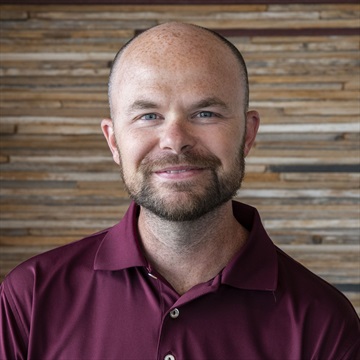We hope you enjoy the look-back from RC and the players' perspective. And never forget the 12 and the 27.
Playing for The 12: An oral history of the 1999 Aggie Bonfire collapse and win over Texas
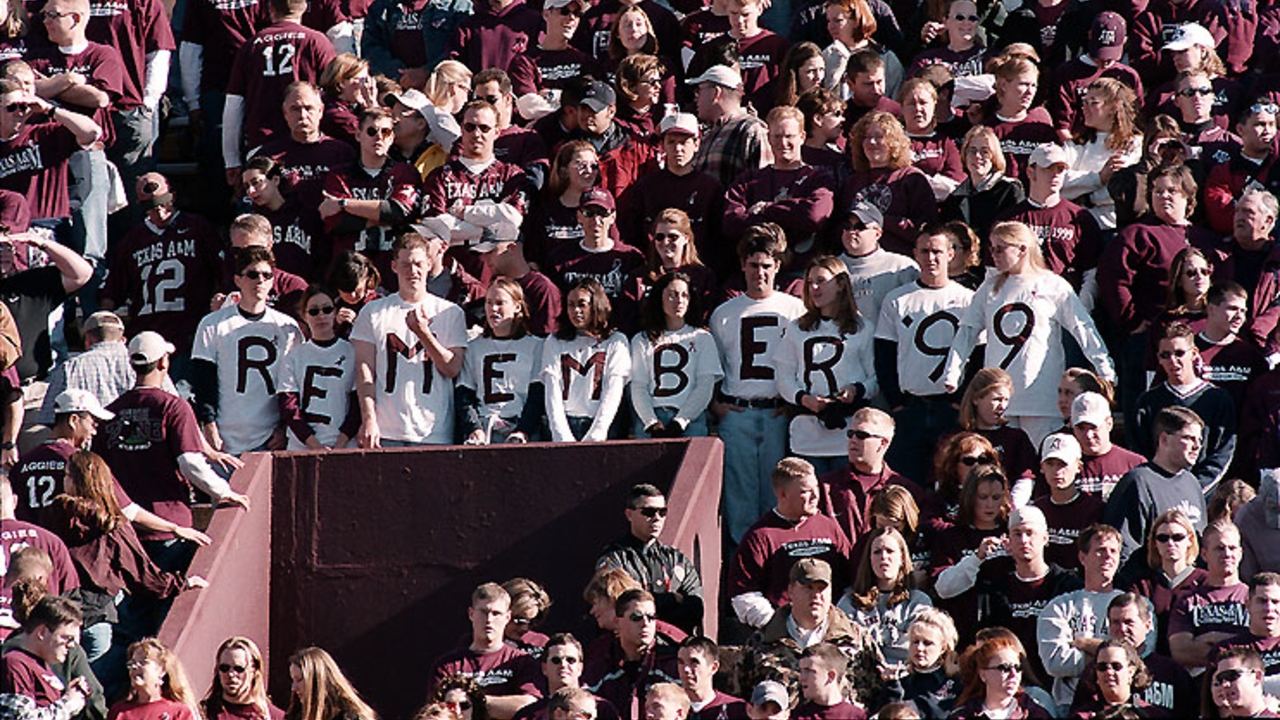
It was early morning on November 18, 1999 in College Station, Texas. A year of careful planning, intense work and incredible motivation were drawing to a close in two opposite corners of the Texas A&M campus. As the football season was ending in one corner, Aggie Bonfire — already climbing 59 feet in 5,000 logs — was nearly complete, ready to serve as the football season’s crescendo before the final game of the season against the University of Texas.
At 2:42 a.m., with dozens of Aggie students in its heights and around its base, Bonfire came crashing to the ground. Twelve Aggies lost their lives. Twenty-seven more were injured.
What took place in the hours and days following the tragedy exactly 20 years ago is well-documented. But this story has never been told exclusively through the eyes and voices and memories of the Texas A&M football team. In the aftermath of the Bonfire collapse, football suddenly did not feel as important as it did prior to the fall. But it proved to be vital to the healing process of an entire community.
A campus bookended by these two champions of the Spirit of Aggieland was shrouded in tragedy. Bonfire had begun in the early hours of November 18, 1907 as a celebration and welcome home after an Aggie Football victory. Since that time, it preserved a spirit of service to all of Aggieland and Aggie Football. And on the exact date — perhaps even the hour — of its inception, the Texas A&M Football team felt the call to serve Bonfire and their fellow Aggies.
The 1999 Texas A&M team’s response will never be forgotten. First, at stack site when the team helped remove logs and debris as part of rescue and recovery efforts, and eight days later inside Kyle Field in a miraculous come-from-behind 20-16 win over No. 7 Texas. The first glimmer of hope for healing came the moment that defensive back Jay Brooks stripped Longhorns quarterback Major Applewhite and freshman linebacker Brian Gamble pounced on the football in the final minute of the game. The spirit of every Aggie present and watching was seen in the image of Gamble, fallen to his knees, arms open, eyes turned to the sky, crying, “We did it! We did it!”
Over the years, we have spoken with dozens of players and coaches about the events of that week and the impact that moment continues to have on their lives. Here is an account of those eight days from the perspective of the Texas Aggie Football team. From first hearing news that Bonfire had collapsed, to the team’s decision to jump into the fray with their fellow Aggies in a time of desperate need, to eventually offering a significant shot in the arm by winning that game against that team on that field.
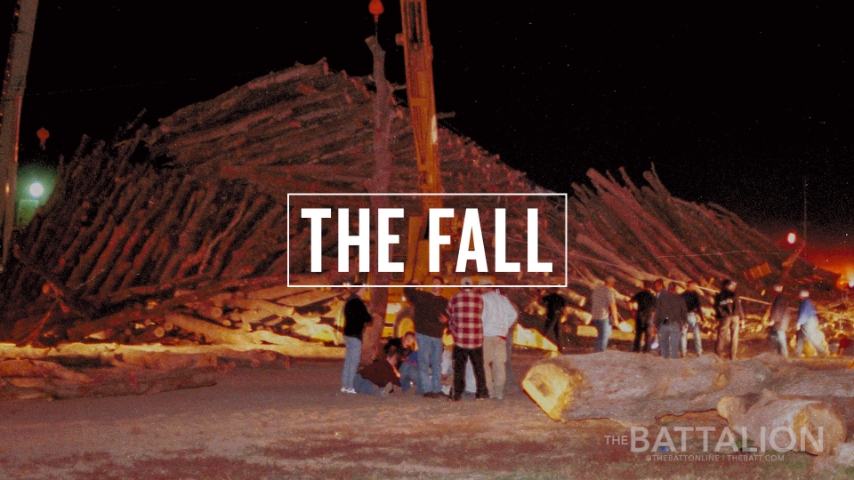
Head Coach R.C. Slocum: I was at home. I was already up having coffee and wasn't far from walking out the door. I got a call from [Texas A&M radio voice] Dave South. He said, “Did you hear about Bonfire?” I said, “No.” He said, “Well, Bonfire has fallen, and it's really bad. There's some people that didn't survive the fall, and they think there are others. They don't know how many others.” I said, “Well, I'm headed up that way right now.” We always had our morning staff meetings out at Kyle Field where our meeting rooms were. I went straight on up there, and the coaches were all coming in for an early morning staff meeting. We talked about it, and at this time, we didn't know the magnitude of it. We knew it was bad, but we didn't know what all happened.
Defensive Back Jay Brooks: I was out there the night it fell. I was with a friend and we were saying, “Damn, they look like they’re having fun!” It was a little late so I said, “Let’s head back because I have to get ready for practice [the next day].” The next morning, people just started calling and calling and calling. We were told to come to the meeting room and by then word had spread around to everybody that the stack had fallen and they were looking for bodies and we need to go do something. It was truly shocking to hear that Bonfire had fallen. That's when Coach Slocum called us out to the meeting room and we decided we were all going out there to help.
Quarterback Randy McCown: We were having a little get together, and of course, like most college kids, it can get a little bit too loud. The cops actually showed up to tell us, “Hey guys, keep it down a little bit.” Well, they hadn't been there more than two minutes. Then, right in the middle of them talking to us about turning the music down, they just hightail it. And of course, when you're in college, you don't think about wondering why they left. You just kind of wipe your brow and go, “Whew, we dodged a bullet.” They go on and we quieted down. We get up the next morning, and Mom calls me before 7:00 a.m. My parents get up and go pretty early, but a call that early wasn't typical. She goes, “Are you okay?” “Yeah, why?” And that's when all of the information came in about Bonfire falling. That was the first way that we kind of got wind of it. After that, it was just a whirlwind. We knew a little bit about Bonfire, but it wasn't like you knew everything about the different shifts and the different groups and all of the Bonfire-specific traditions. So you're just like, “Oh man, I hope everyone's okay.” But you don't really grasp what all is going on. Well, then as you started getting more information, it really starts to sink in. But even at that point, it didn't really sink in until we actually went out there as a team.
Defensive Back Jason Webster: I remember clearly that morning Bonfire fell. It was about 6:00 a.m. and I was getting calls from family asking if I was alright. My uncle saw what was happening on the news and he was concerned that I was involved. I jumped out of bed and woke my roommate, Cornelius Anthony, up to let him know what was going on. It was then that I turned on the television and I saw my school on almost every station.
Linebacker Cornelius Anthony: I vividly remember when the tragedy happened. It feels like yesterday. My roommate (Jason Webster) and I found out about the event on the news and we were glued to the television all morning, checking on the status of the students. I just remember feeling so sad, so helpless and wondering what we could do.
Offensive Lineman Billy Yates: I remember getting a phone call early that morning from my parents about Bonfire collapsing. They were worried that I was at the Bonfire site. I remember turning on the television to look for the story on the news, but I quickly fell back to sleep thinking that there was no way that anyone was hurt. After waking up, I finally saw the news and found out all the details and my heart dropped. I began praying for those who were trapped and their families. I was in shock.
Wide Receiver Bethel Johnson: I remember being awakened out of my sleep by the sounds of blaring sirens. I remember getting out of bed and looking out my dorm room window and thinking, “It's 2 o'clock in the morning ... what could possibly be this bad in College Station for all of the ambulances, fire trucks and police cars to attend?” I thought nothing of it and went back to sleep. That same morning, I was getting ready to go to class and someone told me that Bonfire had fallen and all classes were canceled.
Offensive Lineman Taylor Whitley (Note: we lost Taylor far too soon in August 2018): Starting about 5:30 a.m., the phone at the house started ringing non-stop. After about 15 minutes, I answered. It was my parents checking on me. I had no clue what had happened, so they proceeded to describe that there had been an accident at the Bonfire site, and some kids might have been injured. After checking that my roommates were safe, and not knowing the seriousness of the situation, I jumped back into bed. Around 8:00 a.m., I headed to the locker room to get changed for a morning lift. Once in the locker room, which was more crowded than usual, I started getting bits and pieces of information from everyone. We checked in with our position coaches, and just stayed put until we knew what to do.
Linebacker Brian Gamble: I can remember waking up in the morning to a bevy of missed calls. There were helicopters around and I wasn't sure what was going on. It was just a huge ordeal, and when something of that magnitude is that close and you're viewing it … it was really overwhelming.
Offensive Lineman Seth McKinney: I can remember waking up that morning and hearing the phone ring. I was living with Billy Liucci and Shane Lechler. Our moms kept calling us early in the morning. When we finally answered, they told us to turn on the TV. Right then we knew that a tragic event had taken place at our school.
Offensive Lineman Andre Brooks: I still remember waking up to my mom’s frantic phone call at about 5:00 or 6:00 a.m. to make sure that I was okay. I had no clue what she was talking about. After I found out the news, I understood how tragic this event was but I did not realize the impact it would have on the university and the rest of the world.
Fullback Stacy Jones: I woke up to the DJ on my radio alarm clock saying the Bonfire stack had fallen and students had died. I headed to campus to an 8:00 a.m. class, and I had to go by the stack. After seeing the stack site, I did not want to go to class, but I went anyway. The professor opened the class by telling us if we needed to miss she would understand. I stayed the whole class because I did not know what I could do to help.
Tight End Lonnie Madison: I remember going to my 8:00 a.m. Business Math class the morning it collapsed not knowing anything. I sat in the class with 150 other students with none of us knowing anything. After about five minutes in class, word was spread that Bonfire had collapsed but we hadn't heard that people were trapped.
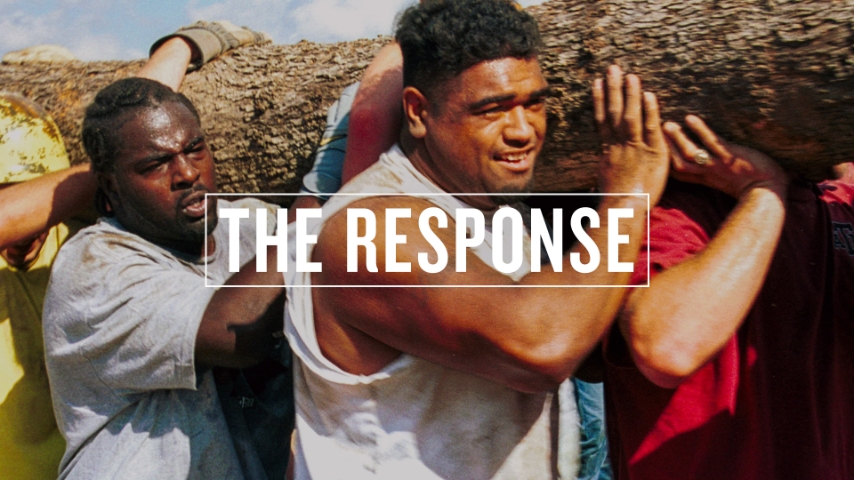
Seth McKinney: The three of us (Seth, Liucci and Lechler) got in the truck and drove down there to the site to get a glimpse and see what happened. When we pulled up, it was a heart-wrenching, devastating experience knowing that people were hurt, injured and, unfortunately, some had lost their lives inside the stack. We were just in shock because of the whole event. Then, it came time for us to go to practice that day. I remember going into the locker room and a few of the guys and I decided that it would be better if we went down there to help out and do what we can. We all went down there and did what we could do to try to lend a hand.
Stacy Jones: I went to the locker room and changed for a weight work out. Someone said that the upperclassmen are at the site helping move logs and they were headed there also. All of us that were there jumped into vehicles and headed over.
Taylor Whitley: After growing tired of waiting, and still in our workout gear, Vance Smith, Billy Yates, Michael Mahan, Chris Montgomery and I headed to the site for a first-hand look. Along the way, we saw hundreds of people walking to the site. Other students, total strangers, jumped in to bum a ride. Headed to the polo fields, we were totally loaded down.
Cornelius Anthony: I remember it being almost time for practice and telling Jason [Webster], “I can't practice with this going on. It will be a waste of time for all of us because we will be thinking about our fellow Ags. Let's go and talk to Coach Slocum and see if he will cancel practice and allow us to help clear the accident site.” So Jason and I talked to guys who were seniors at the time just to see what they were thinking. They all were on board. We all went to Coach Slocum's office and I told Jason to do the talking as we got off the elevator since he was the senior and a leader on our team. I remember Jason, who is typically soft-spoken and extremely reserved, boldly approaching Coach Slocum's desk. With a stern yet respectful voice, he asked if instead of practicing, we could go as a team and help our fellow Aggies in any way at the Bonfire site. Coach Slocum asked if that was the team consensus, to which we responded in unison with a resounding yes! Coach said, “Well, you have my blessing. Go out there, be careful and help your fellow students.” I could tell that Coach Slocum was so proud of us for our decision to help out and for being so bold to ask him to cancel practice. We were all so excited to jump in our cars to go to the Bonfire site to help out.
Jason Webster: I was still unsure about the severity of the situation by the time I arrived to campus. Shortly after that, I headed to campus and ran into some teammates. Most of the team met by the entrance of the locker room under the stadium. We concluded that we wanted to help and do whatever we could to get involved with relief. We wanted to help move logs to assist in discovering anyone that may be trapped. We were thinking, “Hey, we’re the strongest guys on campus so why not go help lift those logs?” So a group of us approached coach Slocum to find out if that would be okay because that would mean he would have to cancel practice. I can tell he had mixed emotions because postponing practice meant one less day of preparation. He considered it and agreed that we should help. Most of the team went and started lifting logs and moving them to designated areas.
Jay Brooks: The captains approached [Coach Slocum] and told him how we all felt and that we had to do our part because those are our brothers and sisters who died at Bonfire, so we had to get out there and do something. There was so much support that they gave us, so we had to go out there and do as much as possible. We got on a bus and headed toward the ground site so we could help.
Randy McCown: There was a small group of seniors — Shane Lechler, Jason Webster and myself — that had been discussing what we were going to do, and then the coaching staff got involved. It was kind of a group effort. We collectively got together and said, “Hey, we need to go.” So people start loading up in trucks and we go out there to Bonfire site.
Coach Slocum: Players started calling. I had decided to have a team meeting at Kyle Field, so we started reaching out to some players to organize a team meeting. Well, some of them, when they heard about the news through friends or family, had decided to go straight over to the Bonfire site. We had some players who were not at the meeting because they were already over at the Bonfire location. At the meeting, I told the team we will not have practice today. I didn't even know if we'd have the game. I said that what we could do is go over there to the Bonfire site and see if we can help in any way. We went over there, and the players and coaches all went.
Billy Yates: Since classes were out, I went over to one of my teammates' house and we were discussing what we needed to do in order to help the situation. We had no idea that we would get an opportunity to do so. Instead of practicing we went out to the site to help any way we could.
Bethel Johnson: The one thing I will never forget was Coach Slocum — without a second thought — canceling practice and bussing the entire team to the site to help. When we arrived, there was a look of relief on all of our fellow students’ faces because they realized we were more than football players and that football wasn't important at that time. The feeling was bittersweet. On the one hand, it was a very sad occasion. And on the other hand, we felt like heroes, joining all of the others from our student body. It was truly amazing to see people from ALL walks of life come together for the same cause to lend a hand.
Andre Brooks: When Coach Slocum talked to us about canceling practice and helping move the logs, not one person voted against it. When we got to the bonfire site, it all sunk in and truly became reality. That day was the first time I had ever sweated and worked so hard with a group of people and not one complaint was made.
Eric Bernard: Walking out onto the Bonfire site that day and seeing the tragedy that had taken place will forever be stamped in my mind. To hear about it is one thing but to actually have been there and witness it first-hand is another. And I can say, seeing so many people come together from all different walks of life was truly amazing to me. That day showed the true meaning of Aggieland.
Taylor Whitley: Driving up to the site, reality struck. With news crews lining the field, helicopters buzzing overhead and fire trucks flashing, we immediately felt the weight of the morning. Like everyone else, we tried to find ways to help. Some students were handing out water, others were on crowd control. About that time, a Red Pot, covered in dirt and obviously going on very little sleep, directed us to follow him. Without hesitation, we did. We weren’t the first football players on the scene. Seth McKinney, Chris Cole, Moses Vakalahi and others were already so drenched that the dirt on their faces had turned into mud. For the next three or four hours, we moved logs back away from the stack in hopes that bigger machinery could get in close. But for now, all we had was manpower. For being a spontaneous effort, it was incredibly organized. The Corps and Bonfire guys took charge. They ordered, we followed. I remember thinking how courageous it was for these guys, many of whom had friends who were unaccounted for, to take the reins and do something, anything. It was pretty incredible. In the early afternoon, one Red Pot called everybody up for a quick meeting. Hundreds of filth-covered Aggies circled around and took a knee like we had so often done around R.C. after practice. After thanking us for the effort, he split the crowd in half with his outstretched arm, instructing those on the right to get food and water and those on the left to get back to work. Jason Glenn, who was on the right-hand half, was the first to get up and switch sides. Jason said, “Football players are over here!” Without hesitation, what seemed like the entire team by this point got up and moved to the “get back to work” half.
Brian Gamble: Going over to the stack to help remove logs was a very surreal feeling. You don't think you would ever be a part of something so tragic. For it to be so close to home, it was surreal.
Randy McCown: They had everything kind of blocked off at first, and they were not using any heavy equipment to move the logs because of how sensitive the area was, with who knows how many people are under there. They were using manpower. When we heard that, we were like, “Listen, you guys can tell us not to help or whatever, but when you're talking about guys who are fit to do any kind of physical labor, your football team is probably your best resource on campus. Here we are, 40 or 50 strong. Listen, we're here to help, so let's go.” We kind of made our way up there near the logs. Being in the wood and pallet business and growing up around logs and sawmills my whole life, I will never forget looking at this 30-foot log that had a 12-inch top and maybe a 30-inch butt. I'm sitting there thinking, “There's no way we're fixing to lift this log up.” We got 15 people on one side and 15 people on the other side. You've got your red pots as team leaders, and they're telling us what to do. They're like, “Alright, we're going to count it down ... 1 ... 2 ... and we're going to lift to our hip, and then we're going to lift to our waist, and then lift to our shoulder.” And we did it. This blew my mind because I thought there was no way we were going to lift this log. Lifting that log has made an impression on me for the rest of my life. I'll never forget looking down that log and seeing a black guy working next to a white guy, who was next to a Hispanic guy, who was next to an Asian guy. It was an experience that brought the entire campus coming together. Although it was a horrible tragedy, it was an extremely unifying experience because you saw all of these people coming together. And then it hit us as players that these folks actually died doing what supports us as a football team. You really started to grasp what it means when somebody says they bleed Maroon and White. This exemplified it more than anything ever could. It really hit home after that whole experience.
Stacy Jones: I remember walking next to the orange fence and just before crossing over, a female Aggie was standing by and I heard her say a soft, “Thank you,” to us. I can remember some Corps members giving us a brief lesson on how to lift the logs. We were supposed to approach the log, “1 ... 2 ... halfway up ... 3 ... 4 ... all the way up.” It seemed that every log we helped with went all the way up at 1 ... 2.
Cornelius Anthony: I think the grief and reality of what had happened didn't truly hit me until I saw first-hand how huge and how heavy those logs were. It took at least 50 of us to pick up and move just one of them. Realizing how strong each of us were, it was at that point that I began to empathize with the victims and their families. I began to put myself in their shoes and felt a rush of just mixed emotions. Grief, anger, sympathy...all at once. And all of this was happening to me while moving the logs. I was just so sad that people were injured and, most importantly, had lost their lives. I'll never forget that day.
Wide Receiver Chris Taylor: When you actually got out there to the site and saw the logs, a piece of you just seemed to be lost. For me it felt like a dream. All the time and effort and care that goes into Bonfire, there was no way it could have collapsed. The sadness, disbelief and tragedy was heavy in the air. Our thoughts were on the students that were on the stack and there was no way we were going to practice knowing our fellow students were in need. We went out and helped as much as we could by moving logs, but in the end, it wasn’t enough.
Lonnie Madison: We made it to the Bonfire site and there were thousands of students trying to do what they could to help. I jumped in with many of the other guys and started moving logs away from the collapsed area. Practice was canceled that day and I just remember being alongside the team moving as many logs as we could. It was a terrible scene that I won't ever forget.
Seth McKinney: I remember being as dirty as you could be in doing whatever we could to help. It took quite an effort to move those gigantic logs, but we were out there to do what we could and I think that it was a moving experience. At one point while we were out there, they removed one of the bodies and we all took a knee. That was our way of showing respect. It was a very saddening and tragic event that we were witnessing. I also remember Coach Slocum calling us together. He asked us what we wanted to do ... to keep helping or to go back and practice. All of us said that we wanted to stay around and continue helping out. I don't know how long we were out there, but we were just a small part of the people who were trying to lend a hand. You hear of team-building exercises. I don't think there is anything bigger than that. It was good for us as a team and as individuals to stay out there that day.
Jason Webster: We were covered with dirt and tree bark was attached to our clothes. Throughout that day, I was shocked, surprised, sad, scared and somewhat confused about the tragedy. Football was the last thing on my mind at that point. After we got done, I think we had a team meeting. Coach Slocum was filling us in on whether or not we would play Texas or not. My mind was not in it. I didn't want to think about football that day. It was a weird feeling.
Jay Brooks: I remember everybody had their football gloves on and dirty Aggies shirts. Our faces were so dirty, as if we were playing in the dirt. We had to pick up huge logs. I remember seeing the team picking up logs like they were nothing. It was crazy to see how everybody was in tune in handling that situation. I've never seen so many people from so many different cities, races and backgrounds have the same hurt in their heart at the same time. As players, we don't get the freshman orientation or see all that goes on with all the traditions and chants and all that stuff. We see it on game day but that's it. That day was a totally different atmosphere. It opened our eyes up and we really got to see what everything meant about that Aggie Spirit with how we all came together that day.
Billy Yates: It was truly a blessing to be at Bonfire site and helping out. I am not sure of how others felt, but this was the first time of many where I felt like I was part of the Aggie family. Not only did that family consist of football players and coaches, I also had thousands of brothers and sisters that "Bleed Maroon," and they were all out there helping. It was great to see so many people from different ethnicities out at the site helping. All felt the pain and sorrow.
Coach Slocum: It was a touching scene to see our players with the Corps guys carrying logs, moving logs away from the site and searching for other fallen Aggies. It was pretty easy to spot the players ... really big guys out there carrying logs. There was something really meaningful about that picture of the student body and the football team all working together. The Corps of Cadets, the regular students and the football players were all saying, “Hey, this needs to get done.” So, in the spirit of Bonfire, everyone wired together. Each Aggie wired to each other. There's never been a time in our history where we were more wired together than that morning.
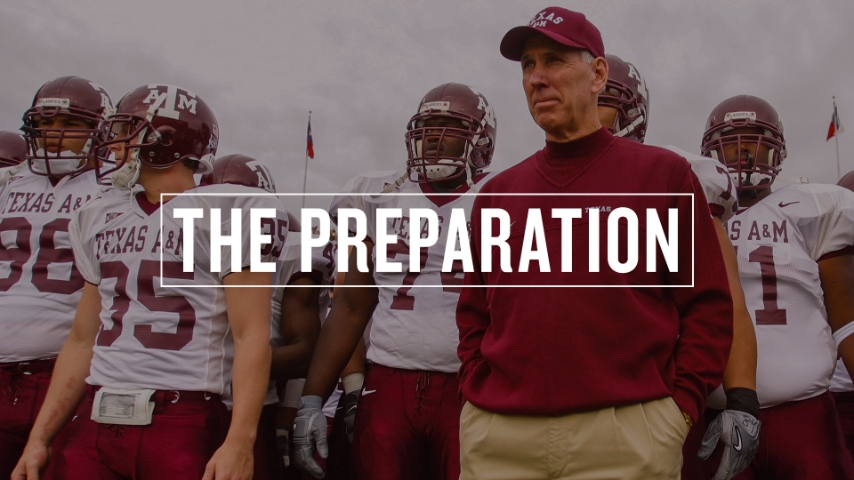
Taylor Whitley: A November cold front passed through College Station in the following days. So cold, cloudy days matched the mood. As details of the tragic night emerged, I remember questioning if football was really that important and if it really mattered in the end. Apparently, I wasn’t the only one, because over the next few days, there was talk of actually canceling the game. Looking back on it, that would have been tragic. Practice leading up to the game was understandably somber, but it did provide us with some sense of regularity. Getting back to the grind of our everyday routine provided some relief from the unending experience that now seemed to be engulfing us. As each new day went by, I remember feeling a sense of relief that we made it through another one, almost as if you could feel the burden getting a little lighter.
Coach Slocum: I ended up having a visit with [then-A&M President] Dr. Ray Bowen, just talking about whether to play the game or not. I had time to think about it. I thought it would be best for the players and for Aggies and their families to stick together and play the game. I thought that would be part of the healing process. I weighed in, but I still didn't know. Obviously, that was not my vote and not my decision. I did vote that I would think we should have the game. They weren't sure what kind of arrangements would be made for funerals, and all those kinds of things were up in the air. The decision was made fairly quickly, as I recall, that we would play the game. Then, the next day, we had a team meeting. I said, “We're going to play the game. I don't expect it to be a real rah-rah, jump up and down, giddy kind of practice. I understand that.” We had players that were close friends with some of the victims. We went to practice and said that we owe it to these people and the spirit of this whole thing to give our best. We were playing Texas, and they were, as I recall, ranked No. 7. I knew it was a real challenge for the game. I told them, “Our obligation is to do the best that we can do in terms of our preparation. To make sure we go out there and go quietly about our business. Go out and be prepared so we can give a good accounting of ourselves.”
Brian Gamble: R.C. never asked us if we wanted to play the game. We prepared the whole way like we were going to play the game. The only break in preparation was the day after the Stack fell. It was just such a weird time emotionally because you know you’ve got to prepare for the game. You’ve got to put everything that you have into preparation to be able to beat that caliber of a team. They were good. All the while, you’ve got all the other distractions going on. It affected people in different ways. I didn’t know anyone that happened to lose their lives in the collapse, but some of our guys did. It was a very crazy rollercoaster of a week, filled with so many emotions that just kind of led into the game.
Jason Webster: Football was the last thing on my mind at that point. But after that tragic day, my focus, and I would dare to say that of the entire team and staff, was locked in on beating the Longhorns. Going back to practice was kind of relieving because it took my mind off of the tragedy for that moment of time. The practices were very productive. We knew they had a good team so we needed to prepare well, and the coaches reminded us of that. During one of the team meetings shortly after the tragedy, Coach Slocum announced team spokesmen to speak to the media. He chose Randy McCown, Shane Lechler and me. I was thinking, “Why me?” I didn't want to be a spokesman. I don't know what to say. Family members might be listening and what if I don't represent them and Texas A&M well? As I stood in front of the cameras and spoke in the microphones, deep down I thought to myself that I might not have the right words but I guarantee I'll know exactly what to do on game day.
Offensive Lineman Chris Valletta: Throughout that week, the team was cut up and scraped from carrying the logs. But as the game approached, a few of the players decided to write the names of the deceased on their jerseys. Writing their names was symbolic because the victims’ families and the legacy they left behind was all that mattered on that day.
Jay Brooks: We wanted to practice, play and win. There was no hesitation. We all wanted to get out onto the field like normal and especially play the game for everybody who had lost somebody and just for A&M. It was bigger than A&M because it was all over the news. It was crazy how much attention the tragedy brought and we wanted to get out there and play ball. Plus, we wanted to beat Texas. That was the main focus. Beating Texas for all the people who lost their lives and just for Texas A&M was very important to us.
Chris Taylor: I remember practice leading up to game day was sharp. I'm not sure I had ever been around a team that was more focused, because we understood what the game meant to Texas A&M. This was more than football. This was about paying tribute. It was about remembering. It was about honoring. We had played Texas, Ohio State, Nebraska, Florida State and UCLA in recent years past, but none of those games held the importance of that '99 game. I remember there being a sense of urgency. It felt like we could not let down our fallen Aggies.
Randy McCown: Nobody wanted to put any pressure on ourselves by saying, “Hey, we're playing for those guys.” But everybody knew. Everybody knew there was a lot hinging on this game.
Coach Slocum: I never tried to load the players down with more pressure than what they already had. I knew that they felt it, and I did too. I just said, “I want you to go out and lay it all on the line and do the very best that you can do.” That's kind of how we approached it. We went about our business. We were all just running on emotions because you never really got away from it. All day, every day, all night, the news was covered with the Bonfire story. The players were bombarded with it from family and friends. It was on all of our minds until we finally got whatever little sleep we were able to get. It was very much a consuming kind of situation. I think we had all been so pent up in our emotion, and the practices were quiet, somber kind of workouts where we were just going through what we were doing. I coached in that game 30 times, more than anybody on either side. The spirit that week is usually an upbeat, giddy excitement. It wasn't like that at all this time.
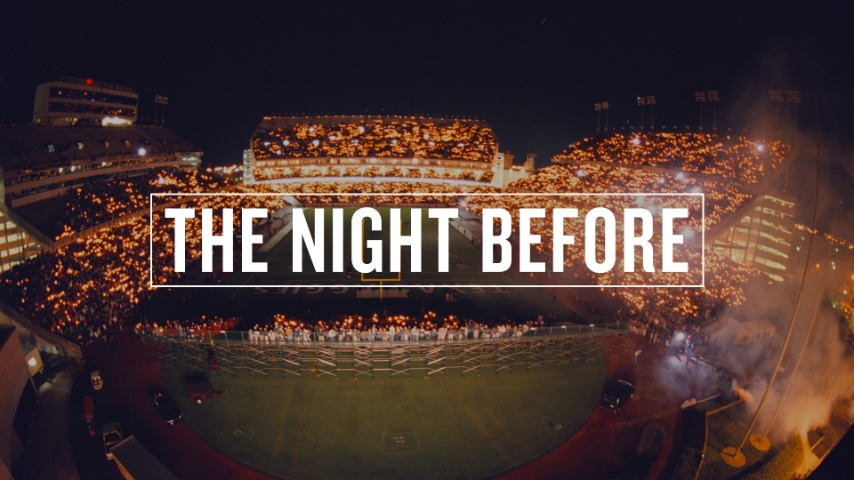
Coach Slocum: In lieu of Bonfire, we had a memorial in Kyle Field. It was a candlelight vigil and memorial service. I made a few comments. The band was there. The whole team was there. We all sat together. I don't know if I've ever seen a more touching, somber feeling. It was a full crowd and everybody lit a candle. To sit there in that stadium with the lights out, dead silent and everybody with a candle, that was a very touching kind of feeling.
Chris Taylor: Yell Practice has been a tradition that has stood for years. I was excited to be able to witness it for the first time leading up to game day. It did not disappoint. That night, it didn’t matter where you were from, your family name, your race, your gender or what your GPA was. We were Aggies. The candlelight visual was amazing. Having a stadium packed to pay tribute to our fallen 12 is one of the memories that I have never forgotten from my days in College Station. There was an optimism, a trust, a hope that through this tragedy, we would wrap our arms around one another and be able to get through it. We were preparing to play our guts out for our 12 Aggies.
Andre Brooks: I’ll never forget the Yell Leader speech. That was the most gut-wrenching, mind-opening, awesome speech, and it brought it all together. However he wrote that, it came out together. There was excitement. We were ready to go.
Brian Gamble: Yell Practice was very emotional. Head Yell Leader Jeff Bailey gave that speech, and I can just imagine what he had to go through to deliver that, because what do you say? You’ve got so many split emotions. You’ve got the game, and you’ve got everything that went on. How do you tie it all together? It was amazing.
Taylor Whitley: Yell Practice on Thanksgiving night, which also served as a Bonfire memorial, was magical. Never before had I felt such a sense of pride. Haloti Ngata, an All-Pro defensive tackle with the Baltimore Ravens, and his family were sitting behind me as a recruit. Even they were welling up with pride. I’ve always wondered how he went to Oregon after seeing that. Rarely in life do you get to experience moments that from then on are indescribable. This is one of them. I remember thinking, “THIS is why I came to Texas A&M. This is what it’s about.” As the football team left Kyle Field that night, the crowd came alive. All 50,000 in attendance decided, at once, that the mourning process was over. It was time to start healing. The guys on the team bus heading to the hotel were giddy. Almost as if we had just received permission to go kick some ass. I didn’t sleep a wink.
Running Back Ja’Mar Toombs: I remember being at the candlelight service, and I’ll never forget the moment of silence when all the lights went out and nothing but candles illuminated Kyle Field. I was so overcome with emotion that before we left the field, I turned to look back and saw another true glimpse of the tragedy when on the field stood the injured and wounded, bandaged and in wheelchairs. Without saying a word, I jogged over to them to personally tell them that we would win and I just wanted them to see the fire had not burned out and that it was burning in my eyes. Before I knew it, the whole team had come over and started shaking hands and hugging those guys. I couldn't leave the field. I wanted the game to be played right then and there. I remember one of my coaches saying, “Save some for the game.” I replied, “There’s plenty more than that in me.”
Stacy Jones: After all of the players left the field and headed to the locker room to get on the bus after the candlelight vigil on Kyle Field, George Bush and George W. Bush were standing there as we entered the locker room. They shook hands and made eye contact with every single player. I was very shocked by their presence, and also appreciative.
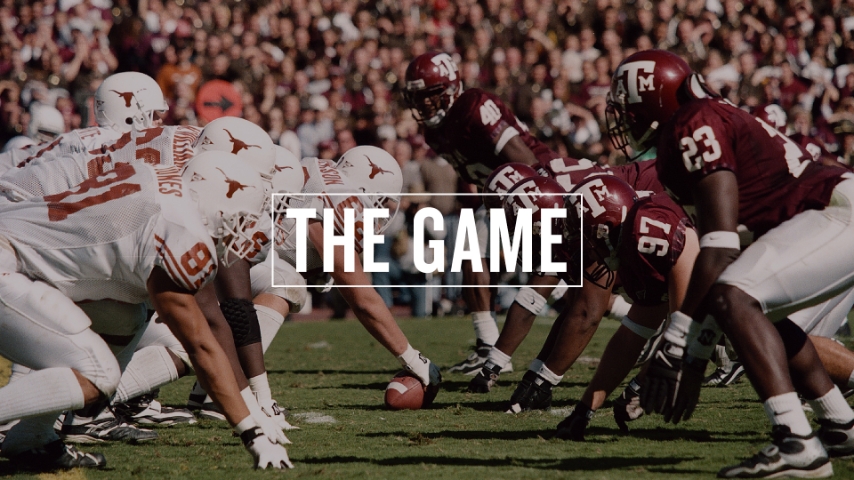
Taylor Whitley: The next morning was beautiful. Sunny, calm. You couldn’t find a cloud in the sky. I don’t remember much being said before the game. Everyone knew what was at stake, no need to talk about it. The stadium was electric, even more than normal, This clearly was not a run of the mill A&M/Texas game. The energy was almost suffocating like it couldn’t quite fit in the confines of the stadium.
Chris Taylor: Going into game day, I remember it was a perfect day. There was an unspoken understanding of what this football team needed to do. It wasn't about adding another win to the left column. It was about doing our part to help our university heal. The flyover, the band, the crowd, that whole game day experience was different than any other I had experienced.
Brian Gamble: The Texas game was an incredible experience. I grew up in the state of Texas as a coach’s son and I've always dreamed of being a part of the Texas A&M-Texas game. I can't remember sleeping much at all the night before. I’m preparing to play that game with all of this on top of it, and it’s a morning kickoff. It was early. I remember we had pre-game meal at 6:00 in the morning. I didn’t sleep because I was so nervous about what was about to transpire. We’re down 16-6 at halftime. We had scored right before halftime, and they blocked the extra point and ran it back for two points. They’re the No. 7 team in the country. Then you go through the halftime show with the great tribute that their band gave to us. We came out in the second half, and now all of a sudden the tides have turned. The emotion kind of gets turned up. I’ll never forget when Major came into the game. It was one of those last couple of drives, and they were backed up into the Zone end of Kyle Field. He’s checking something at the line, and the 12th Man is getting louder and louder and louder. I walk up to the line of scrimmage, and he’s checking. I can’t hear him. I’m probably (three or four feet) from him and I can’t hear a word he’s saying. To play in that type of atmosphere was awesome, and you kind of think, “It’s got to be our day.”
Kicker Terence Kitchens: Heading into game day, it was not like your typical pre-game. Guys weren’t getting hyped up for a football game. It was a really quiet focus. Not a lot guys were talking to each other. Guys were doing their own thing and mentally getting themselves prepared for what we had to do on the field. There was an overwhelming calmness in the locker room but a solemn focus. When we knelt down on the field as a team to pray before the releasing of the white doves, we were in a stadium of 86,000 people and you could literally hear the birds’ wings flapping in the air when they let them go. You could hear the flags hitting the metal on the poles. Outside of being in Kyle Field by myself kicking and practicing, I’ve never heard that stadium so quiet. “Eerie” is a great word to describe that day because it was not normal. Every person in that stadium was dead silent. Aggies and Longhorns alike. To this day, that stands out to me.
Cornelius Anthony: Heading into the game against Texas, it was as if God had given me an epiphany about the oneness and the strength of the Aggie Spirit. Waiting in the locker room before kickoff, I thought to myself about how my fellow Aggies who represent the 12th Man died for something they believed in. The Aggie Spirit. I thought, “God has blessed me and has given me and my teammates the opportunity to go out there and represent them on Kyle Field for 60 minutes through blood, sweat and tears. I'm going to do my best to give them boys in orange pure HELL!” I looked around that locker room and I believe every one of my teammates felt the same way. Instead of music playing and the loose atmosphere you would typically find on game day in our locker room, it was complete silence.
Coach Slocum: I felt on game day that our guys were anxious to go play. They were anxious to get out there. When we got on the field, I thought it was a relief in a way for them. It brought some normalcy into their day. They're playing football and playing in a game. That happens so fast out there that you don't have a whole lot of time to think about anything else. I thought that was a release for them, if you will, from some of the pent up emotions that they carried for seven or eight days. In the game, as a coach, you don't have much time to think. You never really think about, “We're going to win” or “We're going to lose.” You're just playing the next play. Just playing and coaching. I had told them at halftime, “All you can do is the best that you can do. That's all I'm asking of you and that's all you can ask of yourselves. Just play every play and play as hard as you can play. If something bad happens, keep looking ahead to the next play and go play it the best that you can. Let's just play the whole game that way and when we walk off the field, whatever the outcome, we will know that we gave it our absolute best shot.” I said, “There shouldn't be a man in this room, after the game, that can say they should've played a little bit harder. Every single one of you, whatever role you play, leave it all out there on the field. Give it your best effort. If you do that, we can walk off the field feeling good about ourselves.” In my mind — I never said it to the players — but in my mind, I could not envision not winning that game. I just thought somehow we were going to win. Of all the games I've coached, I felt far more pressure that day. I could not imagine not winning that game. We had to win that game.
Jay Brooks: I knew from the beginning we weren't going to lose. We had too much going for us and there was so much more excitement and the thrill to get back out there and play a game that we've been playing all our lives. That particular day, it all changed because everyone was all chained together for Bonfire and for our fallen Aggies. I think somebody had their eyes on us for that day. It was our rival. It was bigger than Texas and Texas A&M, a game we play every year.
Andre Brooks: When we ran out on Kyle Field against UT, we weren’t playing for a better bowl game or for a record. We were playing for the 12 Aggies God called home. The atmosphere on Kyle Field that day was a feeling and sensation that words will never accurately describe.
Randy McCown: That wasn't one of my best games, but whether it was a turnover here or a turnover there, there was always just a level of calmness that you just knew we were going to find a way to pull it through. There was no way we were going to lose that game. You could feel an unspoken sense of urgency and an unspoken level of pride because you knew what was at stake. I can remember my last game at Kyle Field and how if you look back at how that game went, there was a tremendous amount of calmness in that game, and I don't know if it came from a higher power or what, but I can remember riding that roller coaster that game and having a feeling that it's going to be alright. We're going to pull this out. We're going to find a way. It's hard to really peg where that came from, but when you talk about the situation, it's hard not to think about the Aggie Spirit that was there that day.
Jason Webster: On game day, it was all business. I remember coming out for warmup and seeing the stands packed. President Bush [41] and George W. Bush were there. The band was doing their thing. I was ready. And so were the Longhorns. They took it to us the first half. We were not in sync on offense or defense. During halftime, Jason Glenn gave it to the defensive coaches, respectfully of course. He felt like we were playing too soft so he challenged the coaches to let us play more aggressively. I remember him begging the coaches to let us blitz more.
Chris Valletta: Every player on the team wasn't playing to win a game. We were playing for the legacy of the kids who died and who were injured, and the legacy of Texas A&M's most treasured tradition.
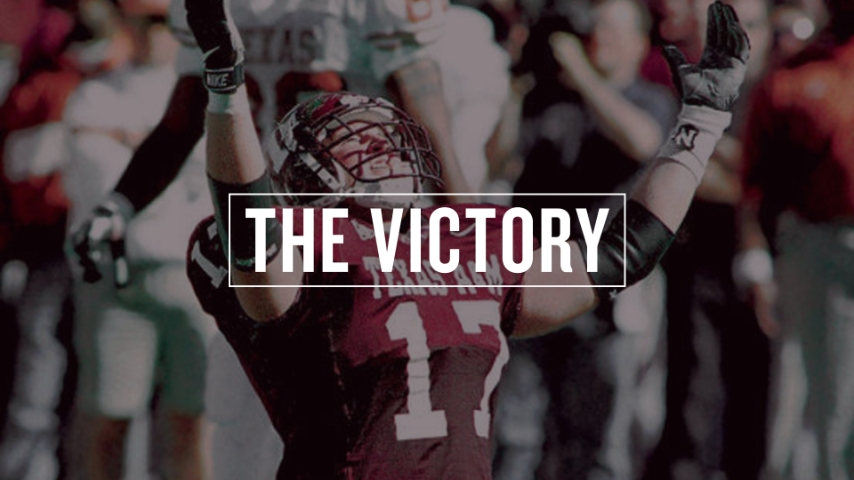
Jason Webster: In the second half, the coaches let us play a more aggressive style of defense. We started getting pressure on the QB. J-Glenn and Jay Brooks got some huge sacks. It changed the momentum in our favor. The fans erupted. When we won I felt so relieved and grateful! We were hugging one another and celebrating as if it was the biggest game of our lives. Which it was.
Coach Slocum: The players did an awesome job of preparation, and they went out on that day and played and really beat a team that was favored to win and was ranked in the top ten in the country. Our guys played over their heads a little bit, and there may have been some divine intervention in that.
Cornelius Anthony: Needless to say, we kicked Texas’ butt that day up and down Kyle Field. I saw the fire in everyone's eyes and we played like it. I had the game of my LIFE. I was so emotional out there. I actually felt sorry for those boys in orange that day after the game because every emotion, all the pain, all the sorrow was taken out on them. That day they were our punching bags. Stress relievers, so to speak. They were in the wrong place at the wrong time.
Randy McCown: Late in the game, we go after them. We don't play prevent defense, and we make a big play late to win it. We were just overwhelmed with emotion. Not to say that A&M needed that win, once it all happened and all took place, you could really say, “Man, that's really gonna help things.” Late in the game, we hit Chris Cole on a deep pass, and we're driving down. We get down there, and we're walking up there in a double tight end set. We got Chris Taylor to one side and my roommate Matt Bumgardner on the other side. I can remember going to the line of scrimmage and looking left, there's CT, and looking right and there's Bum. In my head, I was reminded that Bum would always tell me, “Alright, man. Just throw it up and I'll get it.” If you look at that pass, that pass was a “Throw it up, and I'll get it” pass. It wasn’t a great throw. Then to hear later on that Bum kind of lost it in the sun and it came out of the sun is crazy. You can see how Bum caught it, too. Bum didn't just pluck it out of the air with his hand. He kind of basket caught it. That was my college roommate, a really good buddy, and that's how we ended our college career. You could see that if someone was trying to paint a Hollywood-ending of how all of a sudden it comes out the sun and Bum catches it. It's the last pass that I threw and the last pass the Bum caught at Kyle Field, and it was to beat our arch-rival.
Wide Receiver Matt Bumgardner: On that go-ahead touchdown late in the game, I saw the football come out of Randy’s hand, but then I lost it in the sun and shadows for just a bit. I didn’t have time to think much but I do remember thinking, “This thing is going to bounce off my face mask if I don’t locate it.” I saw it pop out from the shadows and it was right in the breadbasket. I was able to jump over Ahmad Brooks and made sure to get my feet down. After I saw that we scored, that’s when it hit me how huge of a win this would be to take a step forward in the healing process if we could win it. When Jay Brooks stripped Major and Gamble fell on the football, it was a moment of such elation for all Aggies everywhere.
Terence Kitchens: At halftime when we were down, there wasn’t a whole lot being said. Everybody just knew what we needed to do to pull off the win. There was not really a feeling of added pressure but everybody knew that we HAD to win the game and that we had to do our job. As the third quarter expired, we all started getting a little anxious, understanding that, “Hey, it’s time for somebody to make a big play. Something has to happen for this game to turn around.” And then it happened. Punter Shane Lechler pinned them deep. Randy McCown hit Matt Bumgardner for a critical late-game touchdown pass. And of course, Jay Brooks stripped Major and Brian Gamble fell on it to clinch the victory. It was a sense of relief, like some heavy burden had been lifted. We did it. We found a way to win it for all Aggies.
Taylor Whitley: Of course the game was unforgettable. I remember thinking that none of our guys were getting tired. Usually, you get so fired up, that you exhaust yourself. But for some reason, on that day, our guys were flying around, hopping up and playing even faster the next down. Bum’s catch, Gamble’s fumble recovery ... wow. My most unforgettable game ever. And I didn’t play a down!
Chris Taylor: There are two huge plays that I don't think I'll ever forget. Matt Bumgardner with the huge TD catch and Jay Brooks with the strip-sack. I remember Brian Gamble on both knees with open arms looking to the sky. I get chills thinking back on it all.
Ja’Mar Toombs: After Bum caught the touchdown, Jay made Applewhite fumble in the closing moments. Gamble recovered the ball and then raised his hands and head to Heaven. And when Randy finally kneeled to run the clock out, I cried proudly. My man Tiki Hardeman walked me off the field telling me, “It’s gonna be okay.” That still gives me chills. There are so many moments from that day that stand out. I still think about the 12 doves that flew out before the game for our 12 fallen classmates. I played harder than I have ever played in my life that game. I will never forget that day for as long as I live.
Jay Brooks: When we made big plays late to pull off the comeback, it was the loudest I've heard Kyle Field to this day. The game-clinching strip-sack was called Bevo Blitz. We knew that someone had to make a play and I knew it was my time to do it. I was a nickel and the blitz was made for me. When Coach Hankwitz called it, the scenario was perfect. I remember telling guys behind me, “It's on, it's on, it's on.” It was a field-side blitz coming off the second wide receiver and going off the tackle. I remember the D-end was going to occupy the tackle and I had a clean shot. The only thing I remember is hitting the ball and I knew it was over. I didn't realize Gamble had picked the ball up, initially. I could've picked the ball out of his hands. When I get the ball out, I remember Mike Jameson tackling me in the middle of the field. I took off running because I knew the game was over. Then I see Gamble on his knees after he got the ball. Just an amazing moment that I’ll never forget.
Brian Gamble: In the game, I had a sack and an interception, and of course the fumble recovery there at the end. Jay Brooks came off the edge and made the hit on Major Applewhite. I had just shed the block of the tailback and was right there near the ball. I just remember seeing the ball fall. Immediately, as soon as I saw it fall, I fell down on the ball. Once I fell on it, I wasn’t going to let it go. It was just that conscious, “I am not letting this go.” There were some things going on at the bottom of that pile that don’t need to be talked about or mentioned. I wasn’t going to let go of it. I was just down there holding on and holding on and holding on, waiting for the pile to clear, which seemed like it took forever. Once I got up from it, it was just the relief. That’s was that moment was. It was such an emotional relief. All of the stress that we had been through as an Aggie family, as a university, all of a sudden is gone in an instant. When I was coming off the field, I dropped to my knees and raised my arms in the air. It was really like a weight had been lifted off of our shoulders. All of the stress, emotion and everything that happened during that week ... that was just kind of a celebration to say, “We did it! We did it!”
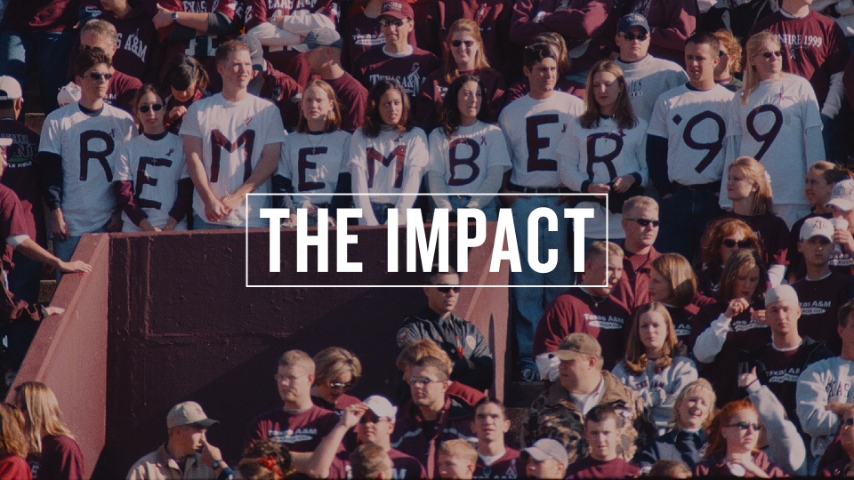
Brian Gamble: Clearly, it was a big play to recover a fumble to seal the game to beat Texas. And as you get older, you realize what that moment meant to so many people as far as the healing process and what the university and Aggie community went through. To know that that moment touched so many people and helped them get by a very difficult time means a lot. I started 47 or 48 games and played a lot of football at Texas A&M, and you always want to leave your legacy in some form or fashion. To know that that play is going to be shown at Texas A&M long after I’m gone and that I was able to make a mark on such a historic program by making a play like that was special. That’s what you play the game for, and you hope that you are able to be one of those guys and be a part of something like that. I was just very fortunate to do so.
Jay Brooks: This was for everybody who had lost their lives, lost their families, lost their brothers and sisters. It was for the school. It was for everything. It was a moment of real pride and honor. It ended perfectly. Everybody had heavy hearts but it ended the way we wanted it — and needed it — to end. And it was much bigger than football. It affected lives that are still affected to this day. Gamble going to his knees and looking up to the sky and thanking God. What a moment.
Coach Slocum: I've been asked many times, “Coach, what was your best game? What was your biggest game?” There were some fun, amazing wins. But without a doubt, the most meaningful game was the win over Texas in ’99. It was a game that when it was over, I felt such a sense of relief. It wasn't jubilation, it was just relief. Relief that we had won the game, which is something that we desperately needed to do. I felt more pressure to win and more relief when it was over to say that we got it done. Right now, I would hate to look 20 years down the road to be here talking to you about a disappointing loss. I couldn't stand the thought of losing that game. We had to win that game. It's always been a relief of sorts when this comes up after ten years and 20 years to say, “Yeah, that was a very meaningful win in a game that we had to win.”
Cornelius Anthony: It was therapeutic, and I know we had 12 angels playing alongside of us. I felt so inspired to play that day, and I'm sure I speak for all of my teammates because it was an HONOR to put on that Maroon and White after all of that happened. Most importantly, it was an HONOR to play for those fallen and injured AGGIES that paid the ultimate sacrifice for something they believed in. I did it for them and it truly was a privilege and an honor to play on their behalf. Now that's Aggie Spirit.
Jason Webster: I believe the win not only helped with the healing process for Texas A&M but also for those families. I would say that is the biggest win in school history because it was not just a football game. It provided hope, encouragement, relief and unity to an entire community.
Seth McKinney: That Texas game in '99 has to rank the greatest game ever played at Kyle Field. I'm just glad that we won the game and provided what little help we could give for those families that lost a loved one that week. Hopefully winning helped them as much as it could. It was a tragic event and an amazing win, and something that all of us will never forget. We’ll always have that experience as members of that team.
Matt Bumgardner: At that age, we weren’t used to dealing with death on that scale. All of a sudden, there were a bunch of our fellow students buried under a pile of logs. It was a surreal situation. Everybody was so emotional because we wanted to make plays. Not for selfish reasons but because we wanted to win that game so badly and needed to win it. How we all came together is something none of us will ever forget.
Terence Kitchens: That win was for every Aggie everywhere. You knew that all Aggies watching that game would be able to start the healing process because of what happened on that field. It gives you tears in your eyes even thinking about it. Still to this day, I have a feeling of, “Thank God, we did it!” You can’t compare it to any other game that we’ve played in our history. I think it would have taken a lot longer for some people to move on from this tragedy if we hadn’t won that game. This gave Aggies everywhere something to cling to during the recovery process.
Chris Taylor: The game meant more than it ever had before. We weren’t playing just to beat the hell out of Texas. We were playing for our fallen 12. Beating Texas ranks among my greatest memories at A&M. Football took a back seat to the memory of the 12 students that lost their lives. I think the tragedy of Bonfire will never be forgotten, but for those three hours, Texas Aggie Football helped a university and a community come together and begin to heal, together.
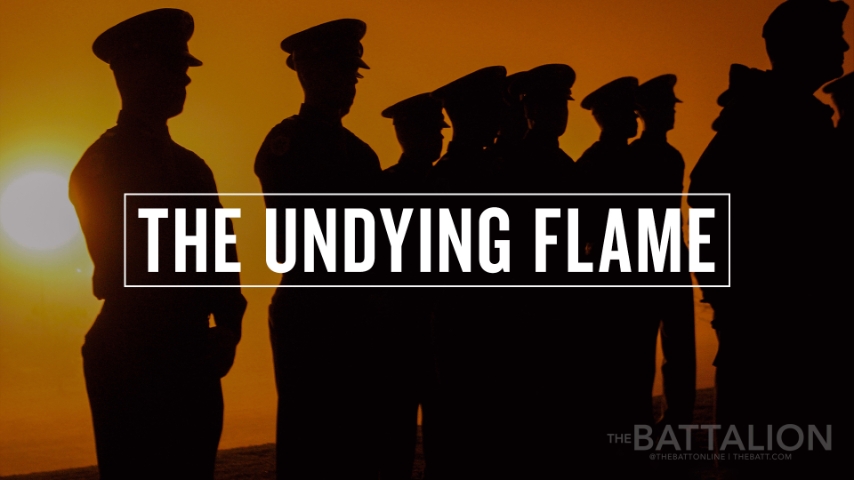
Stacy Jones: After my playing days at A&M were done, I had another semester before graduating. So, in the fall of '03, I decided that I had to go to Bonfire cut. I am really glad that I did. Those are some memories that I hope to never forget. It was great to see that even though the university does not sanction Bonfire anymore, the tradition still lives on through the alumni and the students.
Andre Brooks: After the Bonfire of ’99, I finally understood the meaning of, “From the outside looking in, you can't understand it and from the inside out, you can't explain it.” I was proud to call myself an Aggie the day I signed on the dotted line to play for Texas A&M, but during that whole week of events, I truly understood what it MEANT to be an Aggie. Along with the 9/11 tragedy, I have never witnessed the Aggie Spirit shine so bright.
Director of Football Operations Tim Cassidy: The Bonfire collapse was such a sad tragedy. But in the midst of crisis, I have never been prouder to be an Aggie because of the way the entire Aggie community and our football team rallied to help fellow Aggies. If you ever have any question about what makes A&M special, all you have to do is look back at the events surrounding this tragedy. The Aggie spirit was truly was alive.
Terence Kitchens: It’s the people themselves that keep the Aggie Spirit alive. There isn’t just one thing or one event. Aggie Spirit is bigger than Bonfire and it’s bigger than any one tradition. Every Aggie creates that spirit and helps that spirit live on and it’s just as strong now as it was then.
Chris Valletta: There's no doubt that November 18th, 1999 was the day that I grew up. As kids, especially college kids, we live in a proverbial bubble of invincibility, constantly stating that, “Nothing bad will ever happen to me.” The Bonfire collapse hit home for me, hard. It made me realize that I need to recognize the realities of life and start realizing the things that make my life special, such as my family and friends. Since that day, I've made sure to say, “I love you,” more than ever before, knowing that I may never get the chance again. Bonfire may not burn on campus in the physical sense, but if you're a Texas Aggie, Bonfire is something that burns forever within you.
Never forget the 12 Aggies who lost their lives in the 1999 collapse...
Miranda Denise Adams ‘02
Christopher D. Breen ‘96
Michael Stephen Ebanks ‘03
Jeremy Richard Frampton ‘99
Jamie Lynn Hand ‘03
Christopher Lee Heard ‘03
Timothy Doran Kerlee, Jr ‘03
Lucas John Kimmel ‘03
Bryan A. McClain ‘02
Chad A. Powell ‘03
Jerry Don Self ‘01
Nathan Scott West ‘02
*Note: Billy Liucci and Dion C. McInnis contributed to this story.
